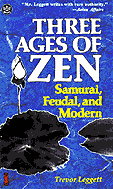
THREE AGES OF ZEN
Extract
From Part III, Autobiography of Zen Master Tsuji Somei
1. Master Gyodo used to say:
'Zen is something about which someone who doesn't really know can still
manage to write without giving himself away. But if you hear him speak just
a couple of words, you know his inner state exactly.'
'In order to see the Nature, it has to be fierce as a lion; but after that
realization, the practice has to go slow like an elephant.'
'If you get through the first barrier (the first koan) without much trouble,
you get stuck afterwards and can't get on. It's as if you'd thrust your
hand into a glue pot.'
'However much you go to Zen interviews, and however many koans you notch
up, if you don't get to the great peace .......'
'Going simply by the number of koans you pass - however many they may be,
it's no good unless you come to the samadhi of no-thought. In the samadhi
of no-thought, there's no soul, there's no body, there are no objects of
the senses, much less any koans.'
After the experience of profound enlightenment which I had on Horomushiro
Island during the war, I had a secret notion that I should have nothing
to fear from any of the classical koans. But when I resumed the interviews
with Master Gyodo after my return from the imprisonment in Russia, I discovered
that it was no such simple matter. The very first one I was given, about
the ox passing through the window (No. 38 in the Mumonkan) took me quite
a number of days to pass through myself. At the same time, thanks to this
koan, there was a marked advance in my grasp of enlightenment. The Master
once said that to hold people up is what a koan is for, and one should appreciate
this. Anyway, it made me humble again, and I assiduously worked at the training
at the interviews.
Synopsis
This unusual book consists of three translations by the author:
(1) Samurai Zen: a selection of the training interviews of Japanese samurai
of the 13th century, when they faced the crisis of Kublai Khan's attempted
invasions;
(2) Feudal Zen: practised by the samurai officials who ran the country during
the 250 years of internal peace under the Tokugawa Government from 1600
- 1868;
(3) Modern Zen: Zen in war and peace in one life. The autobiography of a
Zen priest who was a prisoner-of-war in terrible conditions in Russia, during
which he had nevertheless an enlightenment experience. But as he explains,
he still had to resume his Zen training with Master Gyodo after being re-patriated.
Contents
Part I
Warrior Zen.
Introduction
Selected Koan riddles from translation of Shonan-katto-roku (Record
of Koans given at Kamakura)
Part II
Feudal Zen
Introduction
Translation of Master Torei's 'The Good Steed'
Part III
Introduction
Translation of the autobiography of the late Master Tsuji Somei's 'Treading
the Way of Zen'
Review
Not the least valuable part of the book is the masterly introduction by
the translator which precedes each part.
Japan Times
|
